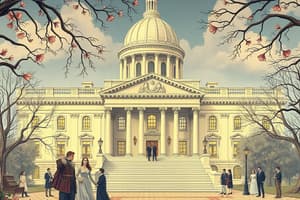Podcast
Questions and Answers
What is the basic principle of American government which states that the government is restricted in what it may do?
What is the basic principle of American government which states that the government is restricted in what it may do?
- Limited Government (correct)
- Representative Government
- Charter
- Popular Sovereignty
Which document established the principle that the power of monarchy was not absolute?
Which document established the principle that the power of monarchy was not absolute?
- Articles of Confederation
- English Bill of Rights
- Magna Carta (correct)
- Petition of Rights
The English Bill of Rights was written to prevent the abuse of power by English monarchs.
The English Bill of Rights was written to prevent the abuse of power by English monarchs.
True (A)
What is a legislative body composed of two chambers called?
What is a legislative body composed of two chambers called?
What was the plan proposed by Benjamin Franklin in 1754 to unite the 13 colonies called?
What was the plan proposed by Benjamin Franklin in 1754 to unite the 13 colonies called?
What is the term for a refusal to buy or sell certain products or services?
What is the term for a refusal to buy or sell certain products or services?
What was the plan of government adopted by the Continental Congress after the American Revolution?
What was the plan of government adopted by the Continental Congress after the American Revolution?
What term describes the formal approval or final consent to the effectiveness of a constitution?
What term describes the formal approval or final consent to the effectiveness of a constitution?
What was the agreement at the Constitutional Convention to count a slave as three-fifths of a person?
What was the agreement at the Constitutional Convention to count a slave as three-fifths of a person?
Who were the persons that supported the ratification of the Constitution in 1787-1788?
Who were the persons that supported the ratification of the Constitution in 1787-1788?
Match the following government plans with their descriptions:
Match the following government plans with their descriptions:
Flashcards are hidden until you start studying
Study Notes
Key Concepts in American Government
-
Limited Government: Government's powers are restricted; individual rights cannot be infringed upon by authorities.
-
Representative Government: Public policies determined by elected officials accountable through regular elections.
-
Magna Carta (1215): A charter that limited the power of the monarchy in England, establishing principles of trial by jury and due process.
-
Petition of Rights (1628): Document asserting that even the king must obey the law, challenging the divine right of kings.
-
English Bill of Rights (1689): Document aimed at preventing the abuse of power by monarchs, influencing American governance principles.
Government Structure and Types
-
Charter: Written constitutional grant of authority given to a city or organization.
-
Bicameral: Describes a legislative body with two chambers, characteristic of the U.S. Congress.
-
Proprietary: A government system organized by a proprietor granted land by the monarchy.
-
Unicameral: Refers to a legislative body that has only one chamber.
-
Confederation: An alliance of groups united for a common goal or purpose.
American History and Constitutional Development
-
Albany Plan of Union (1754): Benjamin Franklin's proposal for colonial unity for trade and defense, ultimately rejected by both colonies and the Crown.
-
Popular Sovereignty: Fundamental American principle that governmental authority originates from the people’s consent.
-
Articles of Confederation: First government framework post-Revolution; emphasized state cooperation but limited central authority.
-
Ratification: The formal approval process necessary for constitutional acceptance or amendments.
Constitutional Convention Highlights
-
Framers: The delegates who designed the U.S. Constitution during the Philadelphia Convention in 1787.
-
Virginia Plan: Proposed a strong national government with a bicameral legislature, population-based representation.
-
New Jersey Plan: Counterproposal advocating for equal state representation in a unicameral legislature.
-
Connecticut Compromise: Established a bicameral legislature with equal state representation in the Senate and population-based representation in the House.
-
Three-Fifths Compromise: Agreement to count enslaved people as three-fifths in determining state population for representation.
-
Commerce and Slave Trade Compromise: Limited Congressional powers over trade and slavery for a specified period, addressing economic concerns.
Political Factions and Legislative Procedures
-
Federalists: Supporters of the Constitution's ratification, emphasizing a stronger central government.
-
Anti-Federalists: Opponents of the Constitution, fearing centralized power and the potential for tyranny.
-
Quorum: The minimum number of members required to be present for legislative decisions to be valid; typically a majority.
Studying That Suits You
Use AI to generate personalized quizzes and flashcards to suit your learning preferences.




